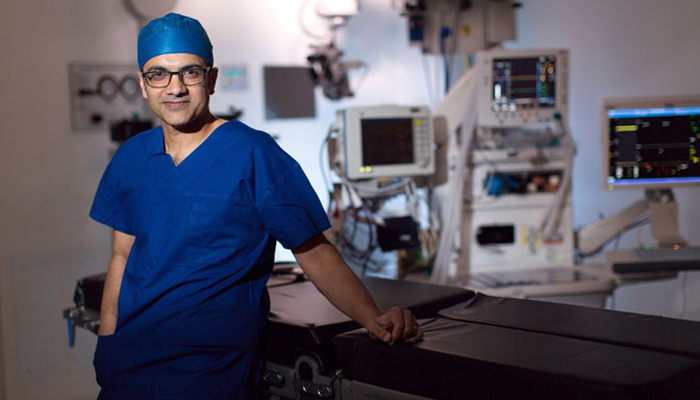To mark Heart Week 2019, on now, Dr Fiona Foo from MQ Health Cardiology Clinic explains 10 ways you can cut your risk of developing heart disease.

1. Get moving
Physical activity is great for your heart health. You should aim to do at least 150-300 minutes of moderate intensity or 75-150 minutes of high-intensity exercise a week; ideally, exercise 30 minutes every day. Two of those days should include strength and resistance training as well as High-intensity interval training (HIIT workouts) if you can, to get your heart rate up.
2. Eat more fresh fruit and vegetables
Try to have a more "Mediterranean style diet" by eating more fresh vegetables and fruit, fish, whole grains, nuts, legumes, and less saturated/trans fats, butters/creams, salt and sugars. Try to avoid processed foods such as cakes, biscuits and takeaways. I tell all my patients to look at the food labels so they’re aware of the saturated fat and sugar content. Anything in a package is going to be worse for you than raw foods – the more raw the better.

Food for thought: Dr Foo recommends eating healthy choices such as plenty of vegetables, fruits and wholegrains.
3. Watch your weight
Maintain a healthy Body Mass Index (BMI) of 18.5 to 24.9 and a waist circumference of less than 80cm for women and less than 94cm for men. Having a high BMI and waist circumference is a big risk factor for heart disease, particularly abdominal obesity which is where you have a lot of weight around your middle. It all comes back to exercising and maintaining a healthy diet.
4. Get up
Avoid being sedentary. If you look at everyone’s lives, we are sitting down while driving to work or on the train, sitting down at a desk in the office, and then at home we’re sitting down in front of the TV. Even if you do 30 minutes of exercise each day it doesn’t mitigate the risk – you need to stand up and sit less, move more and more often throughout the day.
5. Say no to stress
Evidence shows that high stress does increase your risk of heart disease. Certain personalities - Type A personality - are said to be more stressed, competitive and impatient. It’s hard to study stress but it’s quite inflammatory, raising your blood pressure, and heart disease is an inflammatory disease, so there’s that link where stressed people have a higher risk of heart disease. Try to unwind by doing something you enjoy and consider meditation or yoga.

Mindful mantra: Taking part in a yoga class or meditation can help to reduce your levels of stress, says Dr Foo.
6. Don't smoke
Do not smoke or quit smoking if you are a smoker. Smoking affects the vessels that supply blood to your heart by reducing the amount of oxygen in your blood. It can also damage your blood vessel walls. An important point to make is that you don’t have to be an old smoker; unfortunately, even younger people who smoke are presenting earlier signs of heart disease than would be expected. They can have a heart attack at a younger age as a result of smoking.
7. Keep an eye on how much you drink
Alcohol increases your blood pressure which is one of the most important risk factors for having a heart attack or a stroke. There have been different studies on recommended alcohol intake, and whether one glass of wine a night has its benefits, but since then there has been more evidence showing no alcohol is best.
8. Treat depression
Depression is known to be a risk factor for heart artery disease. There’s also evidence to show depression is common after suffering a heart attack, particularly for women, so it can be cyclical in nature. If you have symptoms of depression then talk to your GP and see what options are available for treatment.

Alcohol advice: Different alcoholic drinks have different strengths so it's important to check the label to know how many units you are drinking, says Dr Foo.
9. See a doctor for blood pressure and cholesterol checks
Have a heart health check - the Heart Foundation recommends Australians over 45 years of age have a Heart Health Check while Aboriginal and Torres Strait Islander Australians should have a check when they are over 35. The main thing is that you should know your numbers for your blood pressure, cholesterol and sugar levels. Once you know what these are, then they can be monitored regularly – you’ll never know if you don’t check them. It’s also important to know your family history and whether your parents or relatives have had heart disease, so you can be aware of your risk factors.
10. Take medication
Control your blood pressure, cholesterol and diabetes, and take prescribed medications if required. A lot of people know they have high blood pressure or cholesterol but don’t take medication for it. Also, ensure you’re on an adequate dosage to reduce these to an optimal level.
Seek medical attention if you have any symptoms – it’s better to get checked out sooner rather than later. You can also check your heart age with the Heart Foundation’s calculator.
For more information on heart health and the integrated healthcare service provided by MQ Health Cardiology Clinic, visit the clinic's website.



